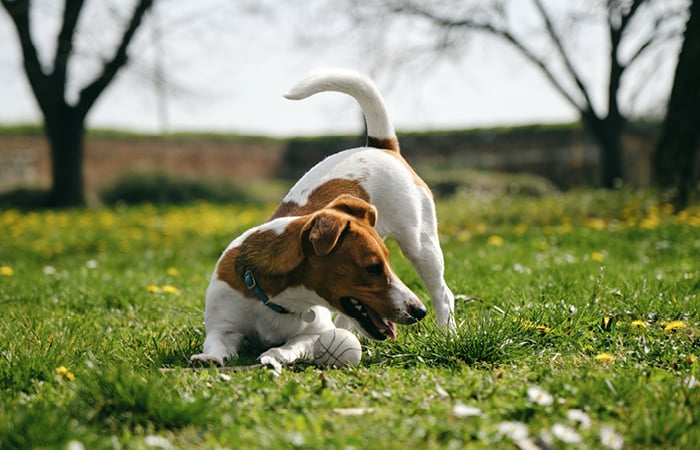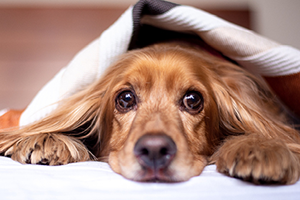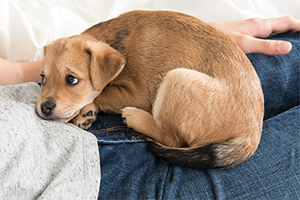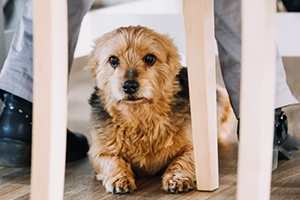How can you help a dog with a noise phobia?
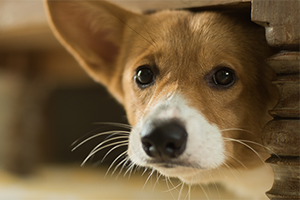
Quick Links
What is a noise phobia?
There is a big difference between a dog being startled by a loud noise and momentarily becoming fearful, and an actual noise phobia. A phobia is an overreaction to something that another animal might be startled by, but quickly recovers from.
A dog with a noise phobia may start to pick up signals associated with noise, such as rain indicating thunder, or even a change in barometric pressure (air pressure in the atmosphere). Or they may even begin to associate some of your behaviours with noises. For example, you going to a certain cupboard may indicate that the vacuum cleaner is about to come out. As a result, they can become fearful long before they hear the sound they are actually frightened of. Noise phobias can be debilitating for dogs and greatly affect their everyday lives.
What causes noise phobia in dogs?
Noise phobia is a problem that can stem from early life, if puppies haven’t been exposed to enough noisy stimuli. While the importance of socialisation to puppies is well understood, habituation is another important process. This is where a puppy gets used to things in its environment, including everyday sounds like vacuum cleaners, lawnmowers and ambulance sirens.
If a puppy is not exposed to these sounds early on, they are far more likely to grow up to be fearful of them. A puppy that has been reared in a fairly noisy, bustling home, will be less likely to develop a noise phobia than one that has grown up in a quiet environment.
Dogs can also become sensitive to sound later in life – for example, if they begin to lose their sight or develop dementia. If you’re worried this could be the case, take a trip to the vet to get your pet checked out.
What are the signs that a dog is noise-phobic?
How can you help a dog with a noise phobia
If severe, noise phobias can affect a dog’s everyday life. Before the problem gets too bad, speak to your vet about getting a referral to a properly qualified pet behaviourist, who can assess the situation and advise you on the best approach.
A counter-conditioning and desensitisation programme can be used as a structured way of introducing noises at a very low level. While a dog is not reacting, they are given treats or played with so that they begin to make a positive association with the sounds. It is worth noting that the process of desensitisation can take a very long time, however, and, if not done correctly, can actually make a situation worse.
In order for counter-conditioning and desensitisation to work, a dog must be relaxed, but in severe noise phobia cases, even listening to a recorded sound on its lowest volume setting can trigger a reaction. A dog cannot learn a new behaviour if they are not relaxed, so medication may be needed initially to calm a dog enough so that they are receptive. Your vet and behaviourist can advise what is best.
Here are some practical things you can do at home to ease your dog’s anxiety if they appear to be suffering from noise phobia:
Make your dog a den

Take a natural approach

Use controlled sounds

Petplan is a trading name of Pet Plan Limited (Registered in England No. 1282939) and Allianz Insurance plc (Registered in England No. 84638), Registered office: 57 Ladymead, Guildford, Surrey GU1 1DB.
Pet Plan Limited is authorised and regulated by the Financial Conduct Authority. Financial Services Register No. 311969. Allianz Insurance plc is authorised by the Prudential Regulation Authority and regulated by the Financial Conduct Authority and the Prudential Regulation Authority. Financial Services Register No. 121849. Pet Plan Limited is a subsidiary of Allianz Insurance plc.


